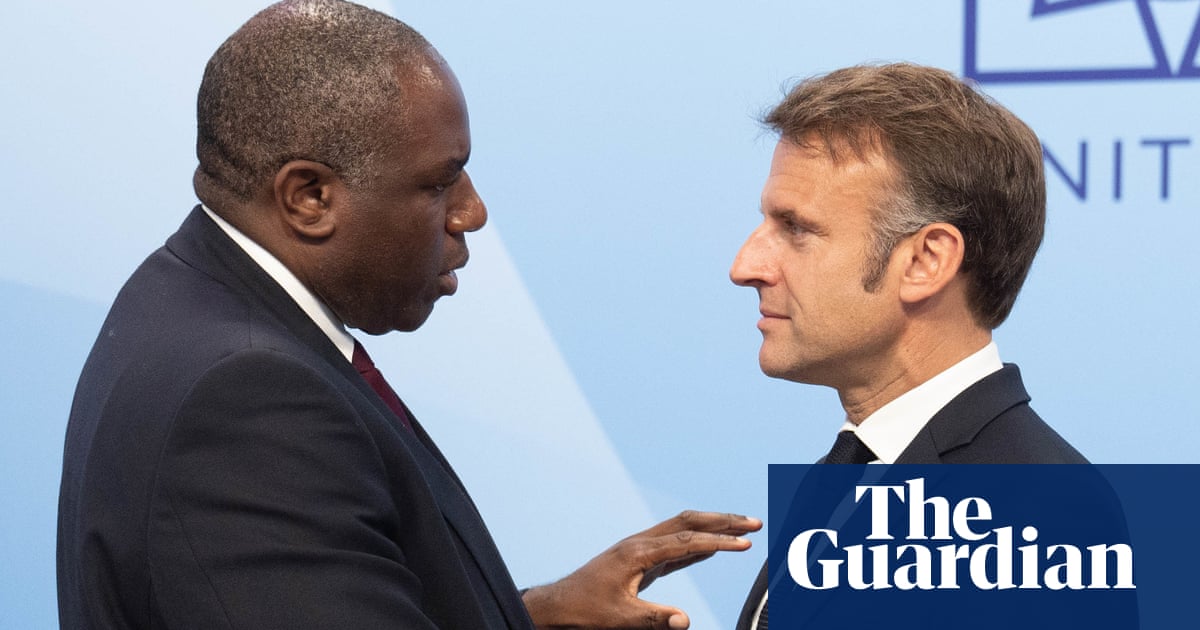The UK is in discussion with France andSaudi Arabiaover the recognition of a Palestinian state at a June conference convened by the two countries on keeping alive the political path to a two-state solution in the Middle East, the UK foreign secretary has said.
David Lammy’s comments mark the first time the UK has acknowledged that a discussion with the French about a recognition process around the conference is under way.
Recognition of Palestine by two permanent members of the UN security council would be a powerful statement but faces many diplomatic hurdles, including a need for greater clarity about whatFranceis proposing and whether recognition could form part of a credible process towards a two-state solution, something Israel is opposing.
Lammy, speaking to the Lords international relations select committee, said the UK wanted to take the step when it would have an impact on the ground and not at a symbolic moment, adding that it was his sad conclusion that some European countries’ recognition of Palestine recently had not had any effect.
Reminded that 160 states had now recognised Palestine, including most recentlySpain, Norway and Ireland, Lammy said: “No one has a veto on when the UK recognises that Palestinian state … We have always said that recognition is not an end in of itself and we will prefer recognition as a part of a process to two states.
“President Macron has had a lot to say about that, most recently, alongside the Saudis, and of course we are in discussion with them at this time.”
He said that in talks with Qatar last week he had been underlining that any long-term solution would require Hamas not to be in government in Gaza and its leadership to leave, probably to a third country. There had to be a full demilitarisation process similar to the one that occurred in the wake of Good Friday agreement in Northern Ireland, he said.
But Lammy said: “It is unacceptable for any group of people to have lived with no state for longer than I’ve been alive.”
He accepted that the accelerating pace of settlement expansion was undermining the viability of two states, and said settlement violence levels were “shocking”.
In the last year, he said, 59 outposts on the West Bank had been built, whereas the average over the previous 25 years was seven.
The latest speculation about the long saga of recognition started whenEmmanuel Macronreturned from a trip to Egypt on 9 April and said France would probably recognise a Palestinian state at the June conference. It would be the first recognition of Palestine by a G7 member state.
A few days later, Macron clarified that the move would be intended to “trigger a series of other recognitions … including the recognition ofIsraelby states that do not currently do so”, remarks that could provide France with a get-out if no momentum towards recognition emerges.
The Israeli prime minister, Benjamin Netanyahu, subsequently rang Macron to warn him that recognising Palestine as a state would be a victory for Hamas and Iran.
Donald Trump is due to visit Saudi Arabia this month where he is certain to be told by Riyadh that Saudi normalisation with Israel, one of Trump’s signature diplomatic themes, is impossible without a credible pathway to a two-state solution.
Michel Duclos, a special adviser to Institut Montaigne, a Paris-based thinktank, argued French political credibility was at stake in its handling of the issue.
He said that since the best outcome from the June conference at the UN “may be nothing more than a roadmap or set of proposals, the dilemma for France may soon become more challenging: can it continue postponing its recognition of Palestine while waiting for a true two-state momentum? Or would further postponement undermine its credibility?”
Lammy showed his frustration with the Israeli leadership’s 60-day ban on aid into Gaza but he proposed no new measures. “The blockade of necessary aid into Gaza is horrendous, the suffering is dire, the need is huge, the loss of life is extreme,” he said.
He said he had been clear in person to the Israeli foreign minister, Gideon Saar, about Israel’s obligations to provide aid when the two menmet in Londona fortnight ago.
